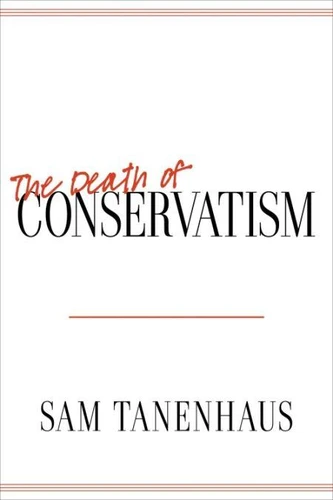The Death of Conservatism
Par :Formats :
Disponible dans votre compte client Decitre ou Furet du Nord dès validation de votre commande. Le format ePub protégé est :
- Compatible avec une lecture sur My Vivlio (smartphone, tablette, ordinateur)
- Compatible avec une lecture sur liseuses Vivlio
- Pour les liseuses autres que Vivlio, vous devez utiliser le logiciel Adobe Digital Edition. Non compatible avec la lecture sur les liseuses Kindle, Remarkable et Sony
- Non compatible avec un achat hors France métropolitaine
 , qui est-ce ?
, qui est-ce ?Notre partenaire de plateforme de lecture numérique où vous retrouverez l'ensemble de vos ebooks gratuitement
Pour en savoir plus sur nos ebooks, consultez notre aide en ligne ici
- Nombre de pages144
- FormatePub
- ISBN978-1-58836-948-2
- EAN9781588369482
- Date de parution01/09/2009
- Protection num.Adobe DRM
- Taille2 Mo
- Infos supplémentairesepub
- ÉditeurRandom House
Résumé
Sam Tanenhaus's essay "Conservatism Is Dead" prompted intense discussion and debate when it was published in The New Republic in the first days of Barack Obama's presidency. Now Tanenhaus, a leading authority on modern politics, has expanded his argument into a sweeping history of the American conservative movement. For seventy-five years, he argues, the Right has been split between two factions: consensus-driven "realists" who believe in the virtue of government and its power to adjust to changing conditions, and movement "revanchists" who distrust government and society-and often find themselves at war with America itself.
Eventually, Tanenhaus writes, the revanchists prevailed, and the result is the decadent "movement conservatism" of today, a defunct ideology that is "profoundly and defiantly unconservative-in its arguments and ideas, its tactics and strategies, above all in its vision."But there is hope for conservatism. It resides in the examples of pragmatic leaders like Dwight Eisenhower and Ronald Reagan and thinkers like Whittaker Chambers and William F.
Buckley, Jr. Each came to understand that the true role of conservatism is not to advance a narrow ideological agenda but to engage in a serious dialogue with liberalism and join with it in upholding "the politics of stability." Conservatives today need to rediscover the roots of this honorable tradition. It is their only route back to the center of American politics. At once succinct and detailed, penetrating and nuanced, The Death of Conservatism is a must-read for Americans of any political persuasion.
Eventually, Tanenhaus writes, the revanchists prevailed, and the result is the decadent "movement conservatism" of today, a defunct ideology that is "profoundly and defiantly unconservative-in its arguments and ideas, its tactics and strategies, above all in its vision."But there is hope for conservatism. It resides in the examples of pragmatic leaders like Dwight Eisenhower and Ronald Reagan and thinkers like Whittaker Chambers and William F.
Buckley, Jr. Each came to understand that the true role of conservatism is not to advance a narrow ideological agenda but to engage in a serious dialogue with liberalism and join with it in upholding "the politics of stability." Conservatives today need to rediscover the roots of this honorable tradition. It is their only route back to the center of American politics. At once succinct and detailed, penetrating and nuanced, The Death of Conservatism is a must-read for Americans of any political persuasion.
Sam Tanenhaus's essay "Conservatism Is Dead" prompted intense discussion and debate when it was published in The New Republic in the first days of Barack Obama's presidency. Now Tanenhaus, a leading authority on modern politics, has expanded his argument into a sweeping history of the American conservative movement. For seventy-five years, he argues, the Right has been split between two factions: consensus-driven "realists" who believe in the virtue of government and its power to adjust to changing conditions, and movement "revanchists" who distrust government and society-and often find themselves at war with America itself.
Eventually, Tanenhaus writes, the revanchists prevailed, and the result is the decadent "movement conservatism" of today, a defunct ideology that is "profoundly and defiantly unconservative-in its arguments and ideas, its tactics and strategies, above all in its vision."But there is hope for conservatism. It resides in the examples of pragmatic leaders like Dwight Eisenhower and Ronald Reagan and thinkers like Whittaker Chambers and William F.
Buckley, Jr. Each came to understand that the true role of conservatism is not to advance a narrow ideological agenda but to engage in a serious dialogue with liberalism and join with it in upholding "the politics of stability." Conservatives today need to rediscover the roots of this honorable tradition. It is their only route back to the center of American politics. At once succinct and detailed, penetrating and nuanced, The Death of Conservatism is a must-read for Americans of any political persuasion.
Eventually, Tanenhaus writes, the revanchists prevailed, and the result is the decadent "movement conservatism" of today, a defunct ideology that is "profoundly and defiantly unconservative-in its arguments and ideas, its tactics and strategies, above all in its vision."But there is hope for conservatism. It resides in the examples of pragmatic leaders like Dwight Eisenhower and Ronald Reagan and thinkers like Whittaker Chambers and William F.
Buckley, Jr. Each came to understand that the true role of conservatism is not to advance a narrow ideological agenda but to engage in a serious dialogue with liberalism and join with it in upholding "the politics of stability." Conservatives today need to rediscover the roots of this honorable tradition. It is their only route back to the center of American politics. At once succinct and detailed, penetrating and nuanced, The Death of Conservatism is a must-read for Americans of any political persuasion.





